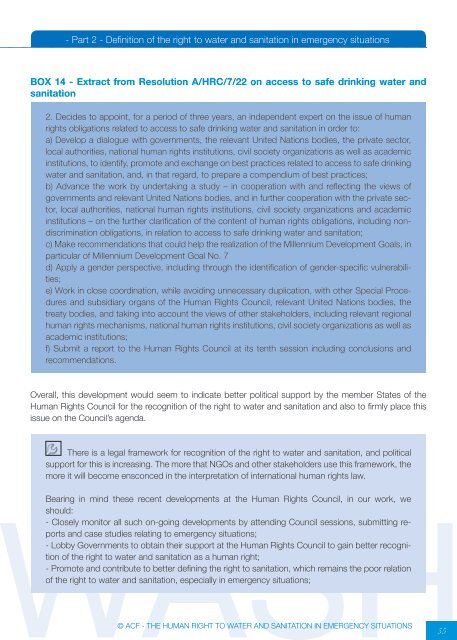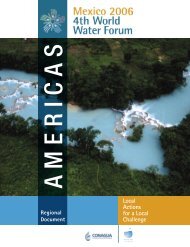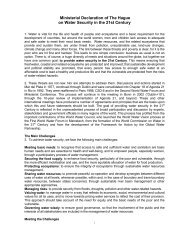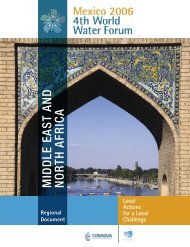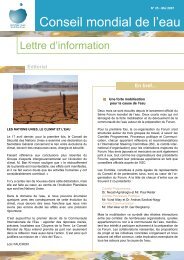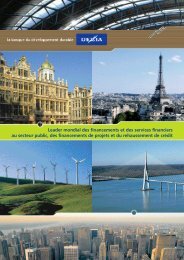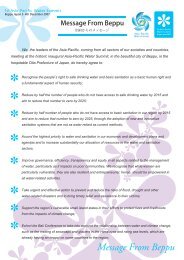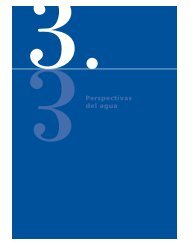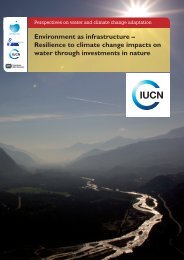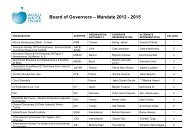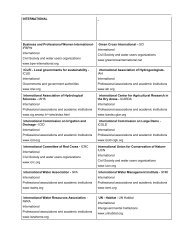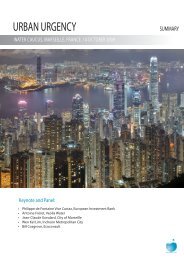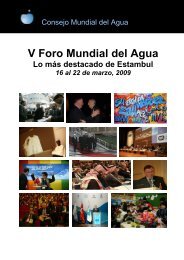the human right to water and sanitation in emergency situations
the human right to water and sanitation in emergency situations
the human right to water and sanitation in emergency situations
Create successful ePaper yourself
Turn your PDF publications into a flip-book with our unique Google optimized e-Paper software.
- Part 2 - Def<strong>in</strong>ition of <strong>the</strong> <strong>right</strong> <strong>to</strong> <strong>water</strong> <strong>and</strong> <strong>sanitation</strong> <strong>in</strong> <strong>emergency</strong> <strong>situations</strong><br />
BoX 14 - Extract from Resolution A/HRC/7/22 on access <strong>to</strong> safe dr<strong>in</strong>k<strong>in</strong>g <strong>water</strong> <strong>and</strong><br />
<strong>sanitation</strong><br />
2. Decides <strong>to</strong> appo<strong>in</strong>t, for a period of three years, an <strong>in</strong>dependent expert on <strong>the</strong> issue of <strong>human</strong><br />
<strong>right</strong>s obligations related <strong>to</strong> access <strong>to</strong> safe dr<strong>in</strong>k<strong>in</strong>g <strong>water</strong> <strong>and</strong> <strong>sanitation</strong> <strong>in</strong> order <strong>to</strong>:<br />
a) Develop a dialogue with governments, <strong>the</strong> relevant United Nations bodies, <strong>the</strong> private sec<strong>to</strong>r,<br />
local authorities, national <strong>human</strong> <strong>right</strong>s <strong>in</strong>stitutions, civil society organizations as well as academic<br />
<strong>in</strong>stitutions, <strong>to</strong> identify, promote <strong>and</strong> exchange on best practices related <strong>to</strong> access <strong>to</strong> safe dr<strong>in</strong>k<strong>in</strong>g<br />
<strong>water</strong> <strong>and</strong> <strong>sanitation</strong>, <strong>and</strong>, <strong>in</strong> that regard, <strong>to</strong> prepare a compendium of best practices;<br />
b) Advance <strong>the</strong> work by undertak<strong>in</strong>g a study – <strong>in</strong> cooperation with <strong>and</strong> reflect<strong>in</strong>g <strong>the</strong> views of<br />
governments <strong>and</strong> relevant United Nations bodies, <strong>and</strong> <strong>in</strong> fur<strong>the</strong>r cooperation with <strong>the</strong> private sec<strong>to</strong>r,<br />
local authorities, national <strong>human</strong> <strong>right</strong>s <strong>in</strong>stitutions, civil society organizations <strong>and</strong> academic<br />
<strong>in</strong>stitutions – on <strong>the</strong> fur<strong>the</strong>r clarification of <strong>the</strong> content of <strong>human</strong> <strong>right</strong>s obligations, <strong>in</strong>clud<strong>in</strong>g nondiscrim<strong>in</strong>ation<br />
obligations, <strong>in</strong> relation <strong>to</strong> access <strong>to</strong> safe dr<strong>in</strong>k<strong>in</strong>g <strong>water</strong> <strong>and</strong> <strong>sanitation</strong>;<br />
c) Make recommendations that could help <strong>the</strong> realization of <strong>the</strong> Millennium Development Goals, <strong>in</strong><br />
particular of Millennium Development Goal No. 7<br />
d) Apply a gender perspective, <strong>in</strong>clud<strong>in</strong>g through <strong>the</strong> identification of gender-specific vulnerabilities;<br />
e) Work <strong>in</strong> close coord<strong>in</strong>ation, while avoid<strong>in</strong>g unnecessary duplication, with o<strong>the</strong>r Special Procedures<br />
<strong>and</strong> subsidiary organs of <strong>the</strong> Human Rights Council, relevant United Nations bodies, <strong>the</strong><br />
treaty bodies, <strong>and</strong> tak<strong>in</strong>g <strong>in</strong><strong>to</strong> account <strong>the</strong> views of o<strong>the</strong>r stakeholders, <strong>in</strong>clud<strong>in</strong>g relevant regional<br />
<strong>human</strong> <strong>right</strong>s mechanisms, national <strong>human</strong> <strong>right</strong>s <strong>in</strong>stitutions, civil society organizations as well as<br />
academic <strong>in</strong>stitutions;<br />
f) Submit a report <strong>to</strong> <strong>the</strong> Human Rights Council at its tenth session <strong>in</strong>clud<strong>in</strong>g conclusions <strong>and</strong><br />
recommendations.<br />
Overall, this development would seem <strong>to</strong> <strong>in</strong>dicate better political support by <strong>the</strong> member States of <strong>the</strong><br />
Human Rights Council for <strong>the</strong> recognition of <strong>the</strong> <strong>right</strong> <strong>to</strong> <strong>water</strong> <strong>and</strong> <strong>sanitation</strong> <strong>and</strong> also <strong>to</strong> firmly place this<br />
issue on <strong>the</strong> Council’s agenda.<br />
There is a legal framework for recognition of <strong>the</strong> <strong>right</strong> <strong>to</strong> <strong>water</strong> <strong>and</strong> <strong>sanitation</strong>, <strong>and</strong> political<br />
support for this is <strong>in</strong>creas<strong>in</strong>g. The more that NGOs <strong>and</strong> o<strong>the</strong>r stakeholders use this framework, <strong>the</strong><br />
more it will become ensconced <strong>in</strong> <strong>the</strong> <strong>in</strong>terpretation of <strong>in</strong>ternational <strong>human</strong> <strong>right</strong>s law.<br />
Bear<strong>in</strong>g <strong>in</strong> m<strong>in</strong>d <strong>the</strong>se recent developments at <strong>the</strong> Human Rights Council, <strong>in</strong> our work, we<br />
should:<br />
- Closely moni<strong>to</strong>r all such on-go<strong>in</strong>g developments by attend<strong>in</strong>g Council sessions, submitt<strong>in</strong>g reports<br />
<strong>and</strong> case studies relat<strong>in</strong>g <strong>to</strong> <strong>emergency</strong> <strong>situations</strong>;<br />
- Lobby Governments <strong>to</strong> obta<strong>in</strong> <strong>the</strong>ir support at <strong>the</strong> Human Rights Council <strong>to</strong> ga<strong>in</strong> better recognition<br />
of <strong>the</strong> <strong>right</strong> <strong>to</strong> <strong>water</strong> <strong>and</strong> <strong>sanitation</strong> as a <strong>human</strong> <strong>right</strong>;<br />
- Promote <strong>and</strong> contribute <strong>to</strong> better def<strong>in</strong><strong>in</strong>g <strong>the</strong> <strong>right</strong> <strong>to</strong> <strong>sanitation</strong>, which rema<strong>in</strong>s <strong>the</strong> poor relation<br />
of <strong>the</strong> <strong>right</strong> <strong>to</strong> <strong>water</strong> <strong>and</strong> <strong>sanitation</strong>, especially <strong>in</strong> <strong>emergency</strong> <strong>situations</strong>;<br />
© ACF - THE HUMAN RIGHT TO WATER AND SANITATION IN EMERGENCY SITUATIONS<br />
55


